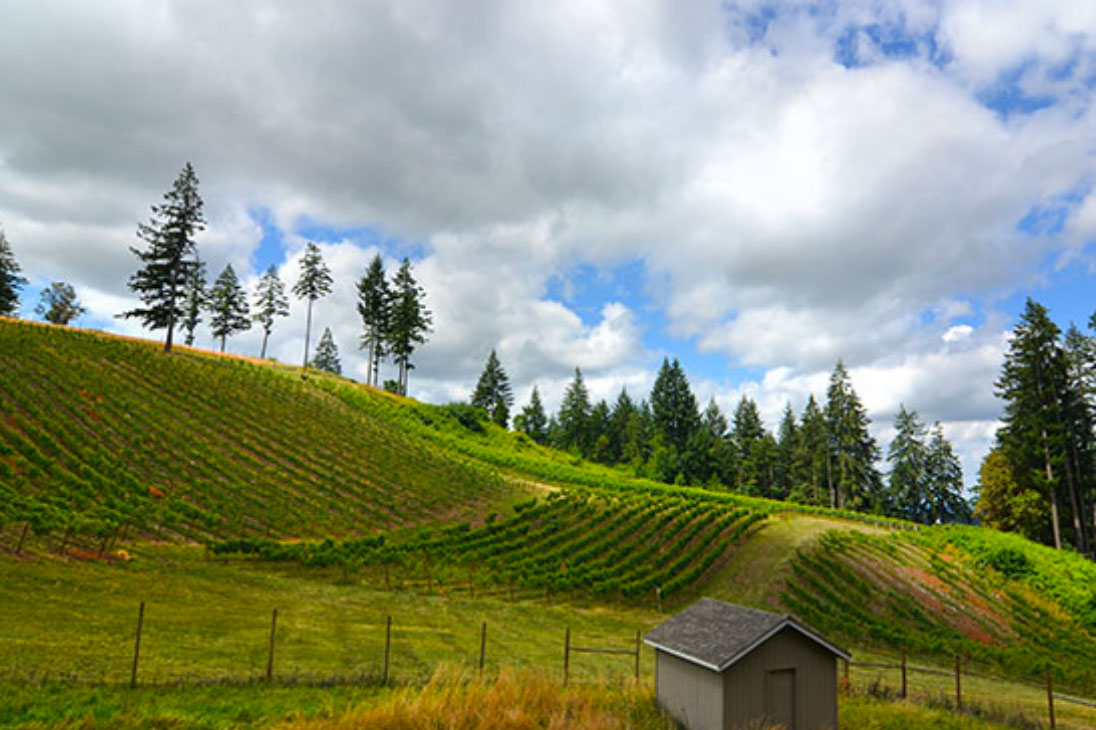As you turn onto Gimpl Hill Road from Bailey Hill Road, you exit the more densely populated neighborhoods surrounding Churchill High School and Kennedy Middle School. After a few tight turns on the road that runs through wooded hillsides you are greeted with a sharp contrast: on one side you see an opulent landscaped drive with stonework and a wrought iron fence; on the other side of the road, homemade signs implore you in black marker to: “SAVE Your WELL” and “STOP The Vineyards at Gimpl Hill.”
Area residents have been organizing to challenge a proposed addition to The Vineyards at Gimpl Hill since they received notice of the planned development in mid-January. The Gimpl Hill citizen group worries the development will threaten the area’s limited water supply. The fight over the proposed development on Gimpl Hill is part of an ongoing struggle pitting developers against long-time residents and advocates fighting rural sprawl.
The developer of The Vineyards at Gimpl Hill, Roy Carver III, has submitted a proposal to the Lane County Planning Commission to rezone 133 acres of property from its current designation as impacted forestland to rural residential property. Under the current zoning the property could be divided into no more than two units. If the land-use designation were to change the minimum lot size would be five acres, which would enable Carver to move forward with the planned subdivision of 14 upscale homes.
The new development would be in addition to nine existing homesites. The current homes are advertised as, “the premier development in Lane County for discerning people looking for beautiful estate lots and the drama of up-close nature.” Each site is advertised as having its own private vineyard.
The Lane County Planning Commission is responsible for evaluating the proposed development and forwarding its recommendations to the Lane County Board of Commissioners, a process planned to last through the summer.
Associate county planner Deanna Wright, who prepared the staff reports recommending approval of the proposal, did not return calls from Eugene Weekly asking about the project.
At a standing room only planning commission meeting on May 16, the developer’s attorney and three geologists hired by the developer reaffirmed their opinion that the property has adequate groundwater to supply the proposed development.
Michael Farthing, the attorney who represents Carver, says that the meeting was “a good meeting.” Farthing says, “The development will be wonderful and done in a top-notch manner.”
According to Farthing, his client only has to consider water availability for the planned development. He points out that Lane County Code does not require the developers to consider the impact the development’s water use will have on adjacent properties, but says he does not think it will harm the neighbors anyway.
“I’m convinced that there will be enough water for [the development] without affecting adjacent properties,” Farthing says.
After representatives of the developers stated their case, a geologist hired by concerned neighbors challenged the methods and conclusions of their analysis. The geologist, Mark Yinger, says that the 2007 study the developers are relying on is deficient because it doesn’t fully consider the specific geology of the area and didn’t recognize the entire history of water problems and well deepenings in the area.
After Yinger spoke, 10 area residents gave testimonials that told a similar story of water shortage, expensive investments in water storage and deepening wells and fear that the new development will only worsen their existing water woes.
Bob Cattoche, who has helped organize the citizens group with the aid of nonprofit advocacy group Lane County LandWatch, points to evidence from well logs that show a history of shortages and well deepenings in the area.
“We have actual evidence that can’t be ignored,” says Cattoche, a retired special education administrator. He also points out that while the feasibility study for water availability was based on 33 residential homes, it did not consider water for the vineyards.
Scott Palmer, who lives a mile due south of the proposed development, shared his story of failed investments in trying to access water on his property. Palmer says that he has seen his water levels go down year after year and that five years ago he spent $10,000 on a well that did not produce. At times he has had to stop watering his fields and gardens, despite the expensive investments in wells and water storage on his property.
Palmer also brought up the problem a fire could cause in the hot months when area wells run dry. “This area is prone to fire danger,” he says. “There’s no water to fight fire. It all has to be hauled in. There’s not enough water to go around. We ask you to deny the application.”
“What is the role of the planning commission if it’s not to uphold the will of the people?” Max Wilbert asks the commissioners, after pointing out that more than 90 percent of the crowd was there to oppose the development.
“The will of the people seems pretty clear in this instance,” Wilbert says.
